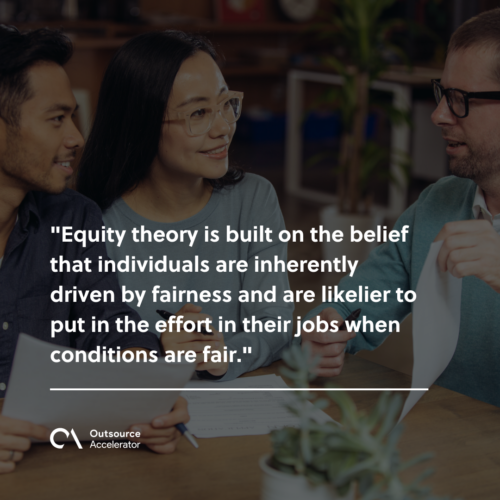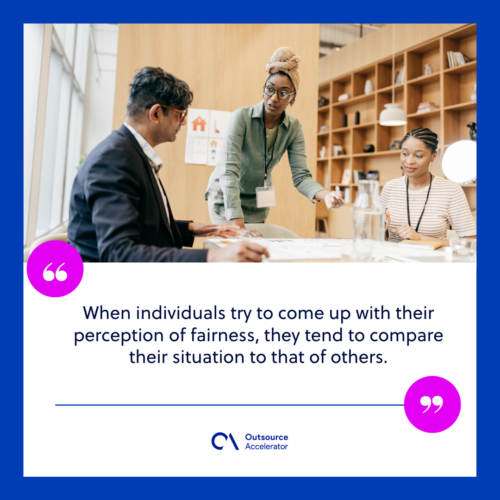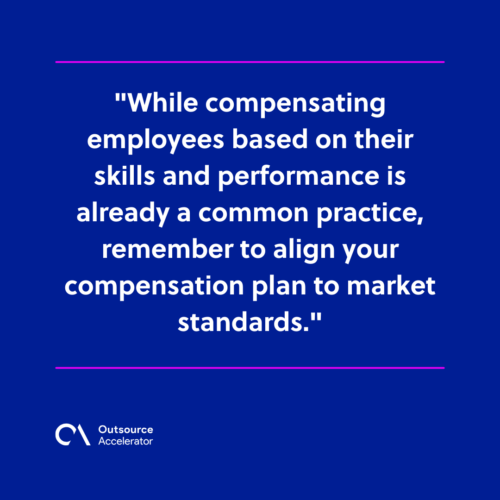Mastering equity theory: A brief guide

No one would like to participate in a job where they are treated unfairly over others. If this is the case, motivation to work and team morale decrease.
Employees are more motivated to succeed when treated fairly for their efforts. This is the overall foundation of the equity theory of motivation.
This theory is key to understanding what drives your employees’ motivation and how it impacts the company.
What is equity theory?
The equity theory of motivation states that employees are more motivated when their inputs (efforts) are compensated fairly. In contrast, they become less motivated when their inputs are greater than their outputs (rewards).
This theory is built on the belief that individuals are inherently driven by fairness and are likelier to put in the effort in their jobs when conditions are fair.
For example, if employees A and B do the same amount of work for the same position, but A gets paid more than B, there is a decrease in B’s motivation.
Essentially, the equity theory tells us that equity and fairness are directly proportional to motivation. The more an individual perceives something as fair, the more motivated they are.

Basic principles of equity theory
The equity theory states that individuals operate based on inputs and outputs, just like a standard and give-and-take situation.
Inputs
Inputs refer to the amount of effort an employee puts into their work, ranging from the different tasks they do to the amount of initiative they take in the company. Intangible skills and qualities, such as loyalty and hard work, count as inputs as well.
It all boils down to how much work (tangible and intangible) the employee puts into their job and how well it is perceived by the company.
Outputs
On the other hand, output refers to the rewards or compensation the individual receives for their input. This includes monetary rewards like pay raises and promotions or non-monetary, intangible rewards like praise and recognition.
It is a standard procedure to reward employees who put in the work by offering them these benefits, so it makes sense that motivation is directly tied to increased output.
Factors that affect equity theory
Equity theory is driven by several factors that could change how employees and employers perceive inputs and outputs.
Referent groups
When individuals try to come up with their perception of fairness, they tend to compare their situation to that of others.
These are known as referent groups or referents, and people may make these comparisons consciously or unconsciously.
There are four main types of referents that people will use to draw comparisons:
- Self-inside – Comparing one’s situation to another one when they were in the same organization
- Self-outside – Comparing one’s situation to one when they were in a different organization
- Other-inside – Comparing one’s situation to another person’s in the same organization
- Other-outside – Comparing one’s situation to another person’s in a different organization

Moderating variables
Moderating variables can directly influence a person’s perception of fairness. These may include their experience level or educational background.
For example, a person with more years of field experience may draw comparisons from other people in the same industry but in a different organization.
In another case, two new employees in a new company are more likely to compare themselves to each other since they are going through a similar process.
Importance of equity theory
Results are everything to a company; the only way to achieve desired results is through dedicated and motivated employees.
The equity theory plays a crucial role in helping employers understand what drives their employees and how they can be motivated to work harder and more efficiently.
Furthermore, the theory helps establish fairness for all employees. No equity is established if a company provides the same output for all employees regardless of input.
On the other hand, if employees are rewarded based on their experience, skill levels, and contributions to the company, then equity is established.
Applications of equity theory
The equity theory can be applied in many ways, each with its goal of ensuring employee fairness.
Fair compensation
While compensating employees based on their skills and performance is already a common practice, remember to align your compensation plan to market standards.
A little market research goes a long way, as it helps establish appropriate and competitive compensation levels.

Communicate with your employees
All employees have different backgrounds and are motivated by different things. It is important to get to know them on a personal level to understand their situations.
Learning about what motivates them and what they value the most gives you a clear idea of how you can adjust to them and help them.
Look out for signs of inequity
Even if employees feel they are not being treated fairly, they may not always be vocal about it. Therefore, keep an open mind and watch out for signs that your employees are feeling inequity.
An employee’s feeling of inequity may manifest in different ways, such as working less or having an overall change in disposition or attitude. As an employer, it is best to address these immediately.







 Independent
Independent




